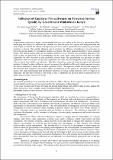Influence of Employee Pro-activeness on Perceived Service Quality by Government Ministries in Kenya

Date
2017Author
Nafula, Fanice J
Marangu, Wilfred N
Mukulu, Elegwa
Muturi, Willy
Metadata
Show full item recordAbstract
In government ministries in Kenya, entrepreneurial behaviour can surface in the form of a government officer
discharging their duties in a different and valuable way from the norm. It is against this background that this
study sought to establish the influence of employees’ pro-activeness on perceived service quality by government
ministries in Kenya. The specific objective was to examine the influence of employees’ pro-activeness on
perceived service quality by government ministries in Kenya. The study adopted descriptive survey research
design. This being a census study; all the executive officers of every ministry were selected to take part in the
study as they are perceived to be knowledgeable on the issues under study and for which they are either
responsible for their execution or they personally execute them. The questionnaire was pre-tested on pilot
respondents who were not part of the study respondents but who were knowledgeable in the study aspects in
order to ensure their validity and relevance. The data collected was analyzed using descriptive and inferential
statistics. Cronbach’s alpha coefficient was used to measure the reliability of the scale, which was used to assess
the interval consistency among the research instrument items. The regression results showed that employees’
pro-activeness had significant and positive effect on perceived service quality by government ministries in
Kenya. The study recommends that government ministries in Kenya should, therefore, strive to improve on
employees’ pro-activeness because it was found to have a significant and positive effect on perceived service
quality by government ministries in Kenya.
